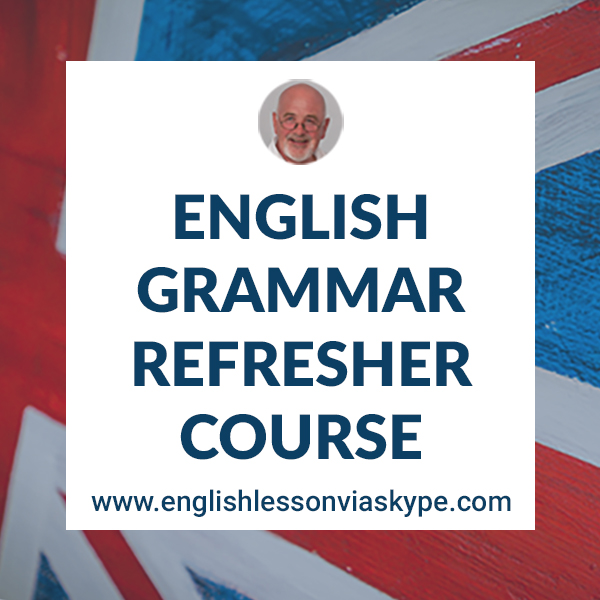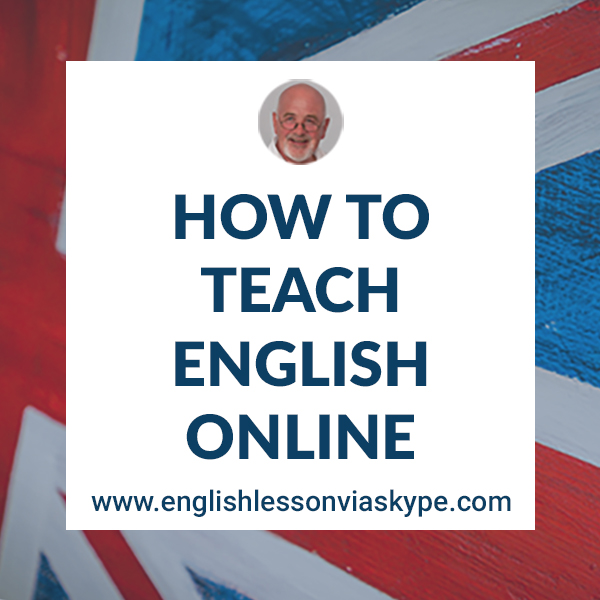Learn 20 common mistakes in English and how to QUICKLY correct them! By the end of this lesson, you’ll have the tools you need to stop making these mistakes and improve your English speaking skills, helping you to speak like a native with confidence.
Listen to the podcast Speak Better English with Harry or watch it on YouTube at Learn English with Harry. englishclass101
Most common mistakes
20 common mistakes in English
Harry
As an ESL learner, making mistakes is a natural part of the learning process. In fact, making mistakes is a good thing, as you never learn without making mistakes.
However, knowing the most common mistakes in English can help you avoid them and improve your language skills faster.
In this lesson, we’ll be discussing the top 20 most common mistakes in English made by ESL learners, including grammar and vocabulary errors. By identifying and correcting these mistakes, you can improve your communication skills and boost your confidence when speaking English.
So, whether you’re preparing for an English proficiency exam like IELTS or simply looking to improve your language abilities, this post is a valuable resource to help you achieve your goals.
improve english on a budget
Online English Courses from €7.99
Misusing modal verbs
Modal verbs are always followed by an infinitive without “to” (the bare infinitive).
❌ I must to study for the exam.
✅ I must study for the exam.
Inconsistent subject pronoun usage
Always put “I” second. “He and I” is correct when referring to the subject. “Him and me” is correct when referring to the object.
❌ Me and him are going to the party.
✅ He and I are going to the party.
Misusing gerunds
When enjoy, admit and mind are followed by another verb, it must be in the -ing form.
❌ I enjoy to swim in the ocean.
✅ I enjoy swimming in the ocean.
Using double negatives
Avoid double negatives at all costs (unless you’re Mick Jagger).
❌ I don’t have no money.
✅ I don’t have any money.
✅ I’ve got no money.
Misusing adverbs
Adverbs qualify the verb; adjectives always qualify the noun.
❌ She speaks good.
✅ She speaks well.
✅ She writes well.
✅ Her writing is good.
Misusing adjectives
We don’t use “very” with non-gradable (extreme) adjectives.
❌ I have a very unique car.
✅ I have a really unique car.
✅ I have a unique car.
20 common mistakes in English
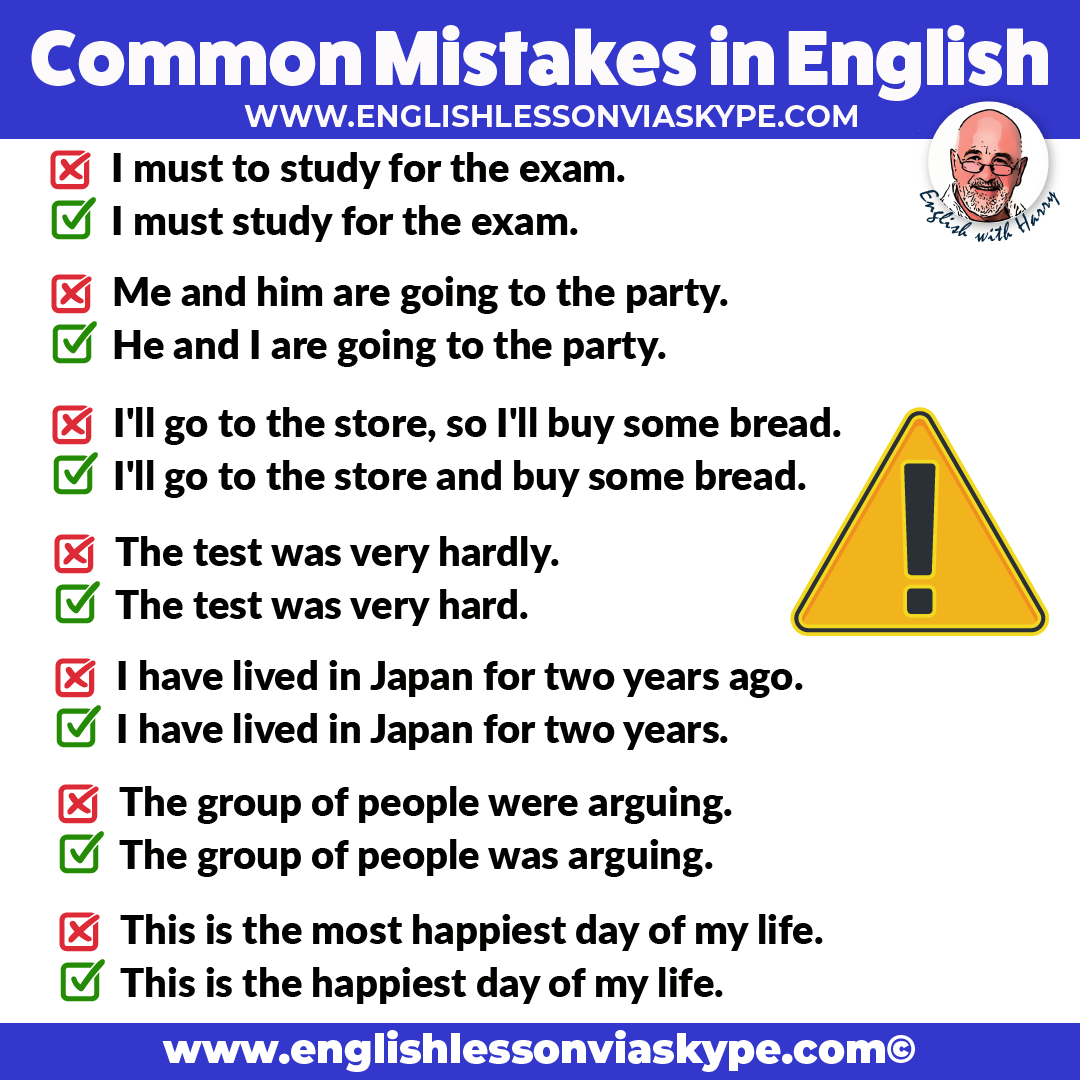
Misuse of verb tenses
The Present Perfect cannot be used with time expressions that indicate a specific time.
❌ I have met her yesterday.
✅ I met her yesterday.
✅ I have met her recently.
✅ I haven’t met her yet.
Incorrectly using conjunctions
You can always change it around to get the right structure.
❌ I’ll go to the store, so I’ll buy some bread.
✅ I’ll go to the store and buy some bread.
✅ I am going to the store so I’ll buy some bread.
Misusing adjectives
“Hard” refers to difficulty; “hardly” means barely, almost not at all.
❌ The test was very hardly.
✅ The test was very hard.
✅ I hardly ever see my children these days.
Using incorrect phrasal verbs
“Put off” means to delay doing sth, to postpone or to reschedule it.
❌ I’m putting off my homework.
✅ I’m putting off doing my homework for a couple of hours.
✅ She is putting off her wedding because she hasn’t got enough money saved.
Incorrectly using comparatives and superlatives
We don’t use “more” or “most” with single-syllable adjectives.
❌ This is the most happiest day of my life.
✅ This is the happiest day of my life.
book your trial English Lesson
Misuse of prepositions
The “to” in look forward to is a preposition, it must be followed by a verb + -ing.
❌ I’m looking forward to meet you.
✅ I’m looking forward to meeting you.
✅ I’m looking forward to reading the book.
Using incorrect phrasal verbs
“Break in” means to make something usable by using it regularly.
❌ I need to break out my shoes.
✅ I need to break in my shoes.
✅ I need to break in my new running shoes so that they don’t hurt my feet during the race.
Misusing verb tenses
“Ago” is usually used with a past tense verb to indicate when the event happened.
❌ I have lived in Japan for two years ago.
✅ I lived in Japan two years ago.
✅ I have lived in Japan for two years.
Misusing conditional statements
Keep “will” and “would” in a separate clause from “if,’ “unless,”etc
❌ If I will have time, I will call you.
✅ If I have time, I will call you.
✅ If I had time, I would learn how to play the guitar.
✅ I will call you unless I am too busy.
Misusing conjunctions
“As” is usually used to describe two actions that happen at the same time.
❌ I like to swim, because it’s relaxing.
✅ I like to swim, as it’s relaxing.
✅ As I was walking to the store, I saw my friend.
✅ I didn’t go to the party because I was feeling sick.
20 common mistakes in English
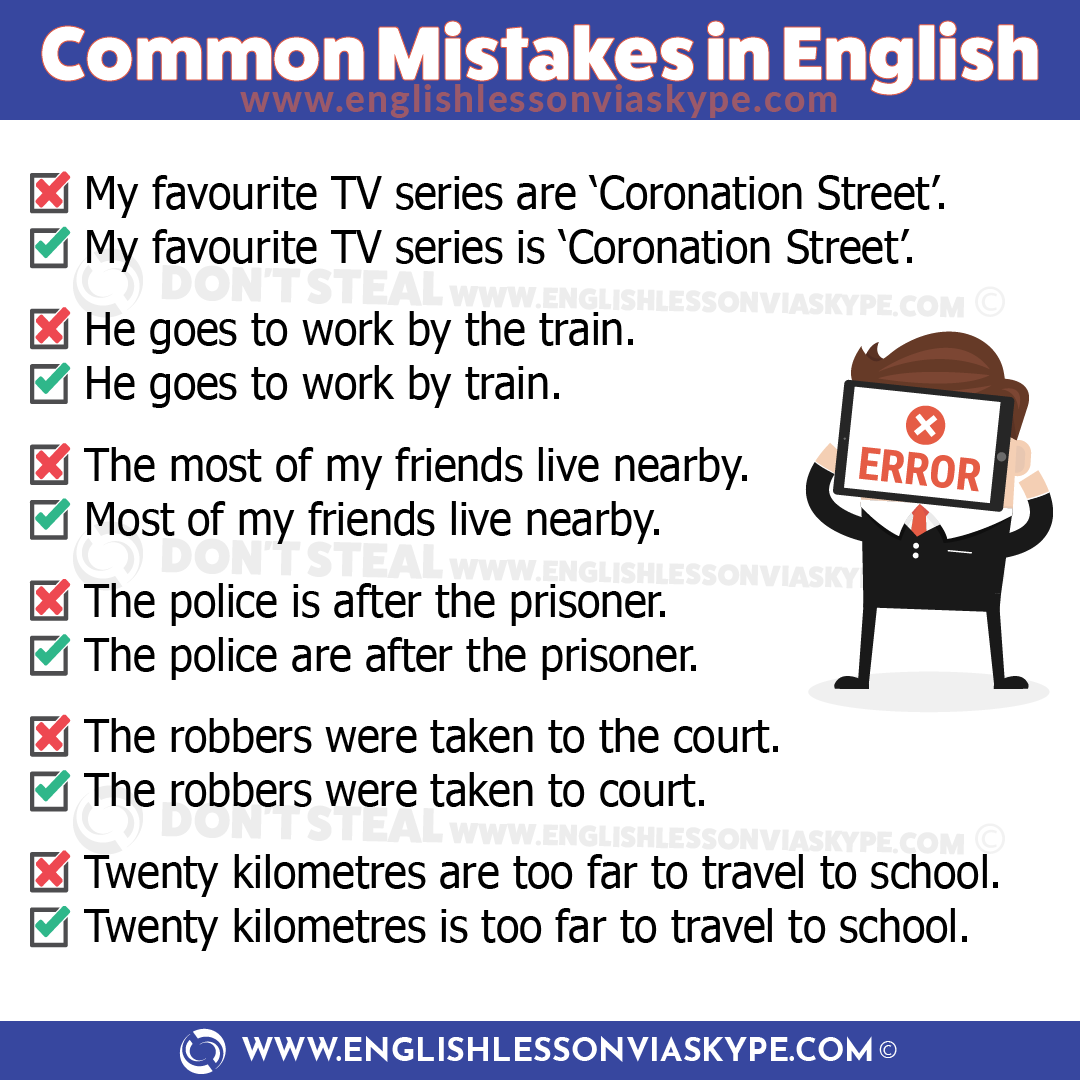
Overusing passive voice
Passive voice can make your writing sound dull and lack clarity.
❌ The mistake was made by me.
✅ I made the mistake.
Incorrect subject-verb agreement
The verb in a sentence needs to agree in number with its subject.
❌ The group of people were arguing.
✅ The group of people was arguing.
✅ There were several people on the street, and they were arguing.
Omitting articles
Leaving out a”, “an”, and “the” when they should be included.
❌ I’m going to store.
✅ I’m going to the store.
Misusing adverbs
Adverbs are used to modify verbs and give us more information.
❌ He runs really quick.
✅ He runs really quickly.
speak better English with Harry podcast- episode 426
Okay, so 20 of the most common mistakes that people make when they’re speaking. And if you want to contact me, you can do so at www.englishlessonviaskype.com. Very happy to hear from you.
And as I said at the beginning, if there’s something you want me to include, then drop me a line, and I’ll happily include it going forward. And if you’ve liked this particular lesson.
Please like the video, and you can also subscribe to the channel because it really, really helps. There are lots and lots of you out there now subscribing to our YouTube channel, and it’s really great to see.
So this is Harry saying thanks for listening, and thanks for watching. And as always, make sure you join me for the next lesson.
more information
For more information on English grammar rules, English collocations and English idioms, check out the links below:
5 types of questions in English
How to complain politely in English
You can always study English advanced level at Learning English with the BBC and British Council Learn English.
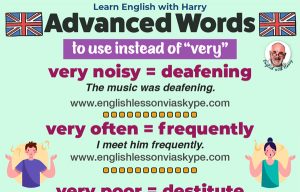
Stop Saying Very In English
Stop saying “Very!” In this vocabulary lesson, you’ll learn how to stop saying VERY in English and replace it with


English Adjectives to Describe Places
Here you will learn English adjectives to describe places. Quaint, medieval, cosmopolitan and more. Let me know which adjectives would


15 English Collocations connected to Traffic
Here you will learn 15 collocations connected to traffic: to beat the traffic, traffic builds up, traffic thins out, traffic
